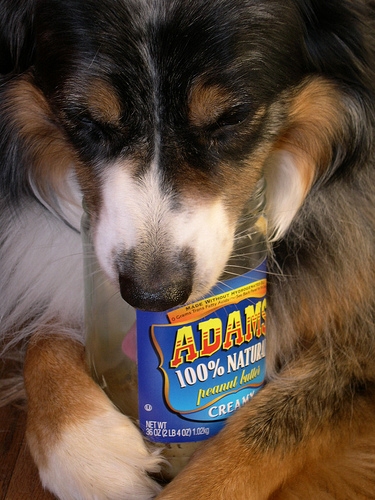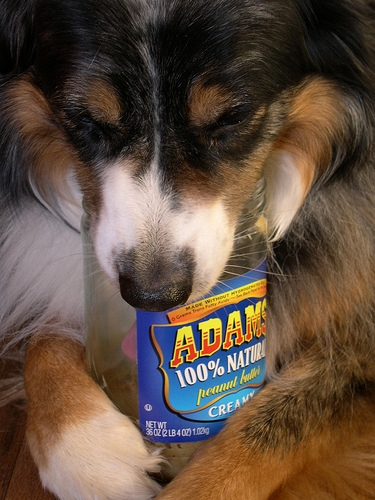Send your question to Umbra!
Q. Dear Umbra,
How important is it to rinse out containers before they go into recycling bins? Does a failure to rinse a jar contaminate the whole bin? What about peanut butter? Cleaning products with chemical residue? Thanks!
kristally
Charlotte, N.C.
A. Dearest kristally,
 Photo: SarahIvy via FlickrAy dios mio. I’m still obsessed with the BP live video feed of the Gulf oil spill and in need of a distraction, so thank you for your question. While yours is a seemingly minor conundrum in the grand scheme of things, I appreciate where your heart is. Particularly while we continue to figure out a solution to help with this ghastly oil insanity (here are 8 suggestions for starters).
Photo: SarahIvy via FlickrAy dios mio. I’m still obsessed with the BP live video feed of the Gulf oil spill and in need of a distraction, so thank you for your question. While yours is a seemingly minor conundrum in the grand scheme of things, I appreciate where your heart is. Particularly while we continue to figure out a solution to help with this ghastly oil insanity (here are 8 suggestions for starters).
Interestingly enough, the Gulf spill brings me to my first point: Lots of these containers we’re using—peanut butter jars, cleaning product spray bottles—are made of plastic. And what, pray tell, is plastic derived from? Petroleum—aka the gnarliness that’s pouring into the ocean as we speak. Of course, recycling old containers, which can be turned into new containers, is better than having to manufacture new plastic from scratch. A better solution is to skip the plastic containers altogether by making your own cleaning products and peanut butter. But that’s sounding a little “hindsight’s 20/20” for your situation.
Here’s the deal: Much like the lime in your beer bottle, a little debris left in your containers won’t spoil the whole lot. So, for the most part, you’ll want to save your water (and your dishwasher space, if you were considering that route). That said, you don’t want to leave half a jar of peanut butter or mayo or anything else (for chem-ridden cleaning products, check with your local toxic waste disposal) in there—it’s just going to sit and spoil, mold, and become a disgusting magnet for insects and rats in a warehouse as it waits to be recycled (sounds awesome, right?).
Dig around in your cluttered drawer o’ kitchen utensils, get out a spatula, and go to town scraping out as much of the remnants as you can. Once you have several containers ready to recycle, fill a big bowl full of water, and give all the recyclables a quick rinse in it.
I have emails in my inbox from other readers expressing their concern about animals—cats, dogs, foxes—getting their heads stuck in these jars as they attempt to go after a last little lick o’ peanut butter. A couple of solutions for this one: Make sure the lid of your recycling bin is firmly in place when you put it out at the curb—granted, stuff could still fall out between your house and the recycling facility—and crush the plastic containers flat before tossing them in the bin.
Emptily,
Umbra
Q. Dear Umbra,
I recently asked my housemate if i could turn off our garage fluorescent light if he was no longer using the garage, and he informed me that it takes more energy to turn it on and off than leave it on. Is this fact or fiction? Is he being loving toward our planet or unintentionally damaging?
Thanks!
Lisa C.
Canberra, Australia
A. Dearest Lisa,
I tackled this question several years ago, but it’s definitely worth a refresher.
In short, turn off the darn light unless you are coming back within two minutes. Contrary to popular belief, turning lights on consumes no more electricity than they use when already lit—the same goes for both fluorescent and incandescent bulbs.
What your roomie may be thinking of is the fact that fluorescent lights do have a finite number of starts built into the “ballast,” the mechanism in the bulb that translates electricity into illumination. But in order to wear out the starts before the rest of the bulb burned out, you would need to turn your lights on and off 20–50 times a day. So unless you or your housemate has some form of OCD that involves switch flipping, it’s really not a concern.
But please do ask him, perhaps with a well-placed, passive-aggressive Post-It note, to flip that garage light off.
Darkly,
Umbra
Q. Dear Umbra,
One thing you missed mentioning in your thoughtful (always) reply to the hot-water-heating-pasta-maker was this: If you live in an older home and you run hot water for cooking use, you are ingesting lead you don’t need from your plumbing. Cold water does not leach the lead out; hot water does. So by filling a kettle for tea with hot water, or for cooking pasta faster, you are, in effect, poisoning yourself, albeit slowly…
Lisanne F.
Chicago
A. Dearest Lisanne,
Excellent point—and another reason not to wait for that hot water. According to the EPA, hot water is likely to contain higher levels of lead. You should use only cold tap water for drinking, cooking, and especially for making baby formula.
Thirstily,
Umbra



